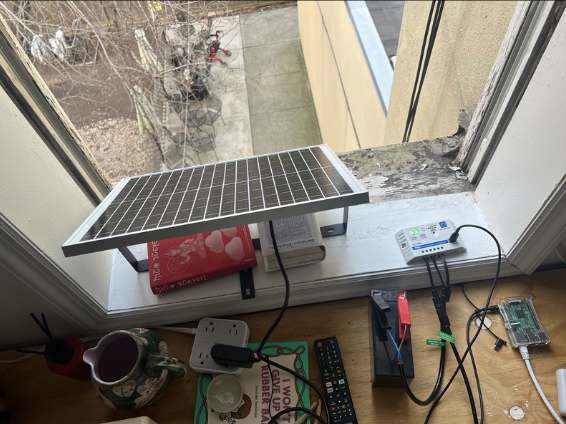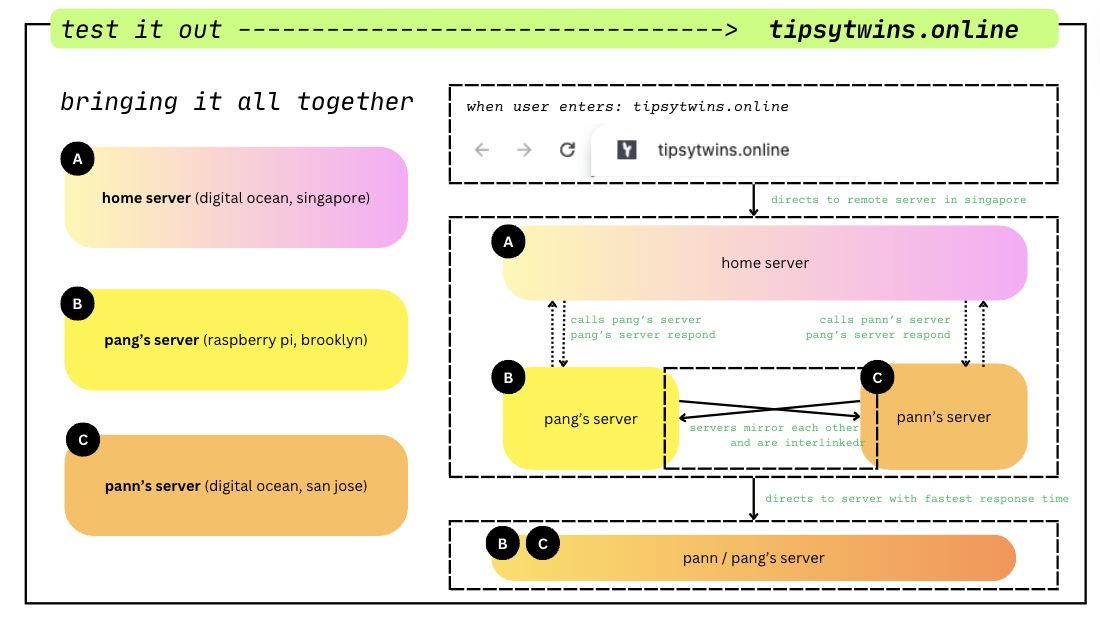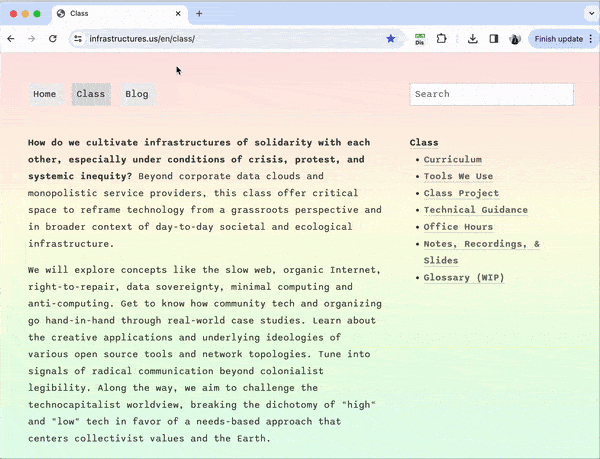Twin Protocols
pang b!
this project is inspired by solar's protocol "a move towards natural inteligence" and work on energy-centered deisgn by the folks at Low Tech Magazine
throughout class i thought about:
? what is infrastructure; is it all machine and metal; where do my flesh and bones fit into this? will it be crushed? will it surrender?
? what historical and colonial legacies does our infrastructure entrench? how do power and politics manifest themselves in our built environment and in our lives?
? how much energy does the internet consume? why are we / is anything suppose to be perpetually online? am i suppose to be perpetually online 4ever?
? what does the internet look like? is the internet a chain of links? is the internet just data living on other people’s computers
? what is local and immediate to me?
? how do i maintain my human ties that also stretch across the land and globe like the internet cables that lay beneath us?
? how do i replicate the interconnectedness that is our shared joy and laughter? how do I rely on natural intelligence and bonds that exist?

and so I tried
1. Setting up a server using a Raspberry Pi powered by a 25w solar panel with 5v batteries; needless to say this is an intermittent source of power. The panel is perched up on my windowsill and gets direct sunlight for a maximum of 3 hours a day. I have to move her down to the courtyard to help extend the life of the batteries. I learned firsthand (literally) about the low and high-voltage systems, inverters, and the difference types of solar charge controllers (including ones with data export ports!!). I learned what about "heavy websites" and the benefits of posting dithered images.
helpful resources: The folks at the low-tech magazine have a wonder guide on how to set up a small solar system as well as how to run a solar-powered website. The folks at Solar Protocol also made a very useful guide.

2. Despite setting out to host an intermittent server, I freaked about about not being online 24/7/365 (but mostly to tweak the content of my server when the sun is not shining and the battery not discharging). There must be something in between being perpetually online forever and existing in a vacuum void of webs; human life is largely somewhere in between. In the Solar Protocol project, the network relied upon the fact that the sun doesn't set; it is merely shining elsewhere. You can rely on the natural intelligence of the sun. So I asked what do I rely on when I cannot be 'on'? Alice, Meghna, and Oren asked us what natural 'protocols' exist in the Universe.
The only right answer seems to be Pann (my twin sister) who lives in California (conveniently where the sun shines when it does not in Brooklyn; but also her sun shines when mine does not or cannot).
her kit included 1) a zine / manual introducing her to self-hosting 2) a Raspberry Pi (w/ ready-to-insert SD card) 3) an ethernet cable 4) a power supply. many hours of calls and remote terminal-ing later, we realize....we still couldn't get the yunohost to up an running....

...so we changed course. If we can't host on a Raspberry Pi, perhaps we can try virtual hosting. We ended up hosting the server a droplet on Digital Ocean in a data center in San Francisco close to where she lives.
Her server is set up to host or generate the same website (mirroring the files I have on mine) with some minor differences (after all we are not identical twins)
fun resources: i realize DigitalOcean has an API that can be connected to many things via pipedream. I tinkered with turning the server on/off based on scheduled time (10am when she leaves for class) or if my sister messages me on Slack that sheis home.....the experimentation continues
3. how do I use these webs of cables and fibers to reflect our web of relationships? how do I connect our servers? I chose to set up a "home base" or a remote server as close as possible to home (server is in Singapore home is in Bangkok) that could a) check if any of our servers are online and b) redirect the visitor to the server with the fastest response time (in theory to the server is physical proximity when both servers are online)
the flow is simple but see some graphics below:
- if only one server is online --> visitors are redirected to this server
- if both servers are online --> visitors are redirected to the fastest server ---? the question remains here if the server closest in distance to you is the fastest server

you can try this out at tipsytwins.online

fun facts: i learned about the internet in Southeast Asia
- The first submarine telegraph cable was made up of seven copper conductor wires and wrapped in “gutta-percha.” the gutta-percha is a rubber tree indigenous to southeast asia. 800,000 trees were felled to supply insulation for 1858 transatlantic cable. By the early 20th century, submarine cables had accounted for the destruction of 88 million trees.
- “Singapore consistently ranks as one of the most desirable data centre location in the world, due to its robust fibre broadband connectivity, strong cyber-security framework, and availability of cloud services” - 60% of DC in SEA are located in Singapore (despite being a small portion of the land)
- Washington has recommended other diversification points [of subsea cable landings] in U.S.-friendly countries nearby, such as the Philippines, Thailand, and Vietnam
4. Create a twin directory! this is essentially a long list of things/knowledge/dreams/allergies that we hold collectively and individually; we are 'standalone' individuals but perhaps more 'reliable' when together because of a natural 'redundancy' (literally our DNAs are very alike and all pun intended)
to wrap it all up...i kept thinking throughout that the internet has always been an excuse.... will remain an excuse; it has been joyous to connect through the internet rather than on it
or much better said “Its a social relation thing. That’s the most important part of the network. It’s not Internet…the network is an excuse.”-- PHILIP GARRISON,ESTHER HAN BEOL JANG, MICHAEL A. LITHGOW, ANICOLÁS ANDRÉS PACE
---
about me: i'm pang! i currently live in brooklyn ny and spend my days trying to understand solar and wind farms. i love cooking Massaman curry with short rib and making pandan-flavored cocktails. i have a twin sister and a dog named maprow. i love them both (latter more than former). i visited a power plant once and felt like the machines were about to crush down on me. i like learning about cities and all the 'systems' (made of flesh, bones, and metal) that allow them to come to life. i miss the days of writing html code for my hi5 and always trying to find my corner of the internet!
email is pangrum.boon@gmail.com and would love to stay c-o-n-n-e-c-t-e-d <3